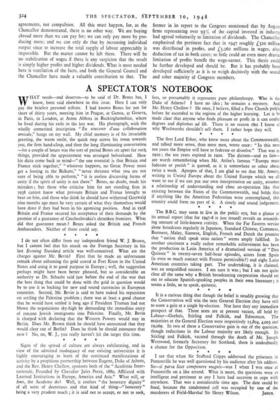A SPECTATOR 'S NOTEBOOK
WHAT needs—and deserves—to be said of Dr. Benes has, I know, been said elsewhere in this issue. Here I can only pay the briefest personal tribute. I had known Benes for not far short of thirty years, meeting him in Prague, at Genoa, at Geneva, in Paris, in London, at Aston Abbots in Buckinghamshire, where he lived during his exile in the last war. His photograph, with the wholly unmerited inscription " En souvenir d'une collaboration amicale," hangs on my wall. My chief memory is of his invariable greeting, the warm smile, the quick step across his room towards you, the firm hand-clasp, and then the long illuminating conversation —for a couple of hours was the sort of period Benes set apart for such things, provided the appointment was arranged beforehand. How his dicta come back to mind—" the one essential is that Britain and France stick together," " whatever happens, no Great Power must get a footing in the Balkans," " never threaten what you are not sure of being able to perform," "it is useless discussing forms of unity if the spirit of unity is not there." Benes, no doubt, made his mistakes ; but those who criticise him for not standing firm in 1938 cannot know what pressure Britain and France brought to bear on him, and those who think he should have withstood Gottwald nine months ago must be very certain of what they themselves would have done if they had been in his agonising position. And in 1938 Britain and France secured his acceptance of their demands by the promise of a guarantee of Czechoslovakia's shrunken frontiers. What did that guarantee mean ? Benes asked the British and French Ambassadors. Neither of them could say.


































 Previous page
Previous page